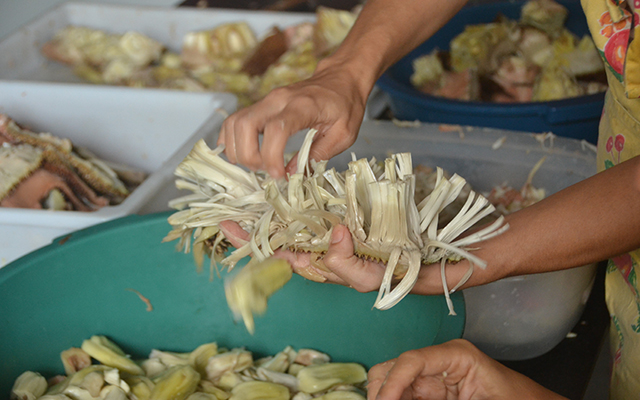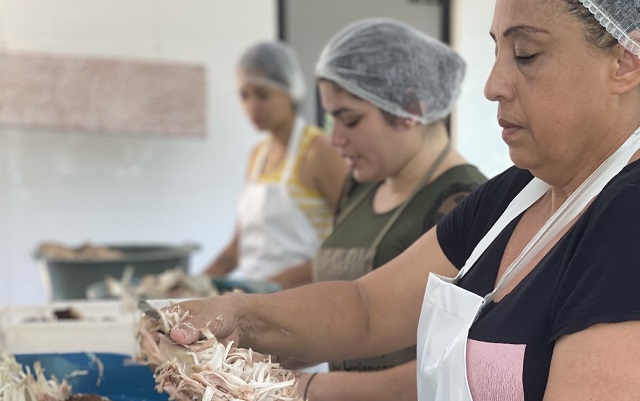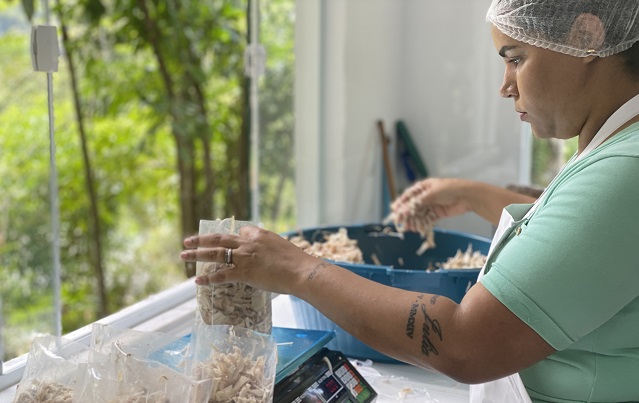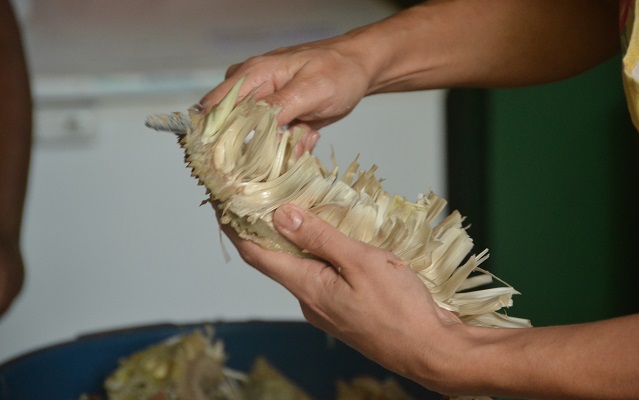Jackfruit – Exotic Species Control through Productive Sustainable Management

The Atlantic Forest is a biodiversity hotspot that extends along the entire coastline of Brazil. The exotic jackfruit tree has massively spread throughout the region and control programs failed to stop its expansion. The IKI Small Grants project designs a prototype for the management of the jackfruit tree. It proposes a paradigm shift: instead of considering it as an invasive species that must be eradicated, it proposes a non-aggressive and non-toxic management. It aims at agroforestry production that is economically viable for small holder famers in the region. To do so, the project removes unripe fruits and uses them for commercialisation. A social enterprise that produces a line of jackfruit-based food products is incubated. The products can be used in a variety of culinary dishes, especially to replace meat in vegetarian cooking. Moreover, the project establishes agroforestry systems with Jackfruit species mixed with other native trees.
INITIAL SITUATION
The project region is situated in the buffer zone of the Serra da Estrela, a landscape of public and private protected areas dedicated for conservation and biodiversity protection. It lies within the Atlantic Forest, of which due to urban sprawl and previous rural policies only 11% is left. Despite of this, it still supplies clean water for 70% of the Brazilian population.
Even with tight forest conservation laws in place, institutional capacity in the region is a challenge and law enforcement is complicated due to land ownership fragmentation.
Adding to the conservation problem, the spread of the exotic species jackfruit causes serious negative impact to local biodiversity. It has a high dispersal capacity due to its resilience, tolerance to degraded soil and large production of fruits.
Several jackfruit population control programs exist. They usually focus on the elimination or insertion of herbicides to kill the tree and invasive interventions in the ecosystem. Nevertheless, their actual success rate is low, due to the species resilience.
TARGET GROUP
The project region is situated in the buffer zone of the Serra da Estrela, a landscape of public and private protected areas dedicated for conservation and biodiversity protection. It lies within the Atlantic Forest, of which due to urban sprawl and previous rural policies only 11% is left. Despite of this, it still supplies clean water for 70% of the Brazilian population.
Even with tight forest conservation laws in place, institutional capacity in the region is a challenge and law enforcement is complicated due to land ownership fragmentation.
Adding to the conservation problem, the spread of the exotic species jackfruit causes serious negative impact to local biodiversity. It has a high dispersal capacity due to its resilience, tolerance to degraded soil and large production of fruits.
Several jackfruit population control programs exist. They usually focus on the elimination or insertion of herbicides to kill the tree and invasive interventions in the ecosystem. Nevertheless, their actual success rate is low, due to the species resilience.
APPROACH AND ACTIVITIES
The main objectives of the IKI Small Grants project are to create an economic value for the conservation of the local rainforest and to control the jackfruit tree through agro-ecological production.
The non-governmental organisation (NGO) Sinal do Vale designed a prototype for the management of the jackfruit tree. It proposes a paradigm shift: Instead of considering it as an invasive species that must be eradicated, it proposes a non-aggressive and non-toxic management involving agroforestry production that is economically viable.
The NGO proposes an alternative technique to control the spread of the species in a more regenerative and financially lucrative way for property owners, consisting of the removal of unripe fruits for commercialisation. It incubates a social enterprise that produces and commercialises a line of jackfruit-based food products. The green jackfruit is processed into various by-products that can be used in a variety of culinary dishes, especially to replace meat in vegetarian cooking.
The fruits are sourced from local landowners who are gradually trained in the technical and entrepreneurial skills required to replicate the management prototype on their own land.
By installing a food processing plant, creating a line of organic food and building a value chain, the project guarantees landowners incomes and access to the local and regional market. The small to medium size plant is large enough to ensure financial sustainability and continued participation of the beneficiaries after the project is completed.
LATEST PROJECT HIGHLIGHTS AND IMPACTS
- Project finalized.
CAPACITY DEVELOPMENT
IKI Small Grants supports Sinal do Vale in their organisational capacity development through:
- Training on landscape mapping and use of GIS software. This allows to use secondary data to assess the level of degradation of landscape areas and watershed health as well as reading big data to assess specific landscape needs.
- Carbon sequestration calculations through the soil and forests.
- Monitoring and evaluation techniques for environmental impact: measuring biodiversity, water increase, and soil regeneration in relation to the jackfruit management and agroforestry interventions.
ABOUT THE ORGANISATION
Instituto Sinal do Vale is constituted as an Organisation of Civil Society of Public Interest (OSCIP). It was founded in 2012 and has reached 40 communities and 2000 students and volunteers. It conducted 60 hospitality events and planted around 11,000 trees so far.



